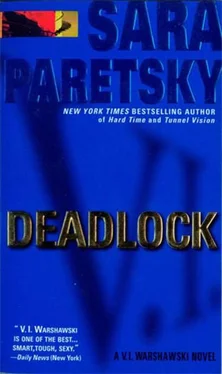Grafalk stopped on his way back to the bar and looked at me. “You suspect them as well? You’re sure the-uh-damage took place at the Port? Could it have been vandals?”
I swallowed some more sherry. “Yes, yes, and possibly, although I don’t believe it. It’s true anyone could empty brake fluid with a little ingenuity-but what vandals carry around a ratchet wrench and a cutting torch just on the off chance that they’ll find a car to mutilate? They’re much more likely to slash tires, steal hubcaps, or smash in windows. Or all three.”
Grafalk brought over the sherry bottle and topped off my glass. I tried to pretend I drank the stuff every day and didn’t attempt to read the label. I’d never be able to afford this sherry anyway; what did I care what it was called?
He sat back down with a fresh martini and looked at me intently. He was turning something over in his mind. “How much do you know about Martin Bledsoe?”
I stiffened. “I’ve met him a few times. Why?”
“He didn’t tell you anything about his background at dinner on Thursday?”
I put the expensive glass down with a snap on the tiled table. “Now who is spying on whom, Mr. Grafalk?”
He laughed again. “The Port is a small community, Miss Warshawski, and gossip about shipowners travels fast. Martin hasn’t asked a woman out to dinner since his wife died six years ago. Everyone was talking about it. Likewise your accident. I knew you were in the hospital but I didn’t know someone had deliberately tampered with your car.”
“The Herald-Star gave me a front-page story-picture of my poor Lynx with its front missing and everything… Gossip about Bledsoe must be buried pretty deep. No one gave me a whiff about his background that sounded as troublesome as you’re seeming to imply.”
“It is buried deep. I’ve never told anyone about it, even when Martin left me and I was mad enough to want to hurt him badly. But if there has been a crime committed, if there’s been an attempt on your life, you should know about it.”
I didn’t say anything. Outside, the house cast a lengthening shadow on the beach.
“Martin grew up in Cleveland. Bledsoe is his mother’s maiden name. He never knew who his father was. It could have been any of a series of drunken sailors on Cleveland’s waterfront.”
“That’s not a crime, Mr. Grafalk. And scarcely his fault.”
“True. That’s just to give you a flavor of his home life. He left when he was fifteen, lied about his age, and signed on to sail the Great Lakes. In those days you didn’t need the training you do now, and, of course, there was a lot more shipping-no waiting around union halls hoping to get called up for a job. Any warm body that could haul ropes and lift two hundred pounds would do. And Martin was strong for his age.” He paused to swallow his drink.
“Well, he was a smart fellow and he came to the attention of one of my mates. A man who liked to help the young men in his charge, not stand on their heads. When he was nineteen Martin ended up in our Toledo office. He obviously had far too many brains to waste just doing muscle work that any stupid Polack could handle.”
“I see,” I murmured. “Maybe you could find an opening for me on one of your boats if detective work palls.”
He stared at me for a minute. “Oh, Warshawski. I see. Don’t show your hackles-it’s not worth it. The waterfront is filled with Poles strong as oxen but not much brainpower.”
I thought of Boom Boom’s cousins and declined arguing the point.
“Anyway, to make a long story very short, Martin was operating in an environment he could understand intellectually but not socially. He’d never had much formal education and he never learned any sense of ethics or morality. He was handling too much money and he siphoned some of it off. I lost a tough argument with my father about prosecuting Martin. I had found him, I had pushed him-I was only thirty myself at the time. I wanted to give him a second chance. Dad refused and Martin spent two years in a Cantonville prison. My father died the month before he was released and I hired him back immediately. He never did anything else criminal that I’m aware of-but if there’s some trouble between Pole Star and Eudora Grain or at Eudora Grain itself that involves money, you should know about Martin’s background. I’m relying on your discretion to keep it to yourself-I wouldn’t want Argus, or even Clayton, for that matter, to know about it if it turns out nothing’s wrong.”
I finished my sherry. “So that was what you meant that day at lunch. Bledsoe educated himself in prison and you were hinting you could tell people about it if you wanted to.”
“I didn’t think you’d caught that.”
“Even a boneheaded Polack couldn’t miss that one… Last week you were threatening him, today you’re protecting him-sort of. Which is it?”
Anger flashed across Grafalk’s face and was quickly erased. “Martin and I have-a tacit understanding. He doesn’t attack my fleet, I don’t tell people about his disreputable past. He was making fun of the Grafalk Line. I was backing him off.”
“What do you think is going on at Eudora Grain?”
“What do you mean?”
“You’ve leaped to a couple of conclusions, based on my investigations down at the Port. You think there might be some kind of a financial problem down there. You’re concerned enough to reveal a well-concealed truth about Bledsoe. Not even his ship’s officers know it-or if they do, they’re too loyal to betray it. You must think something pretty serious is wrong.”
Grafalk shook his head and gave a slightly condescending smile. “Now you’re leaping to conclusions, Miss Warshawski. Everyone knows you’ve been looking into your cousin’s death. And they know you and Phillips have had a few words together-you just can’t keep secrets in a closed community like that. If there is something wrong at Eudora Grain, it would have to involve money. Nothing else important could be wrong there.” He swirled the olive in his glass. “It’s none of my business-but I do periodically wonder where Clayton Phillips gets his money.”
I looked at him steadily. “Argus pays him well. He inherited it. His wife did. Any reason why one of those possibilities wouldn’t be good enough?”
He shrugged. “I’m a very wealthy man, Miss Warshawski. I grew up with a lot of money and I’m used to living with it. There are plenty of people without money who are at ease with and around it-Martin’s one and Admiral Jergensen another. But Clayton and Jeannine aren’t. If they inherited it, it was an unexpected windfall late in life.”
“Still possible. They don’t have to measure it in your class to afford that house and their other amenities. Maybe a crabby old grandmother hoarded it so that it would give everyone the least possible pleasure-that happens at least as often as embezzlement.”
“Embezzlement?”
“You’re suggesting that, aren’t you?”
“I’m not suggesting anything-just asking.”
“Well, you sponsored them at the Maritime Club. That’s impossible for the nouveaux riches to crack, from everything I read. Not enough to have a quarter million a year for that place-you have to trace yourself back to the Palmers and the McCormicks. But you got them in. You must have known something about them.”
“That was my wife. She undertakes odd charities-Jeannine was one that she’s since come to regret.”
A phone rang somewhere in the house, followed shortly by a buzz on an instrument I hadn’t noticed earlier, set in an alcove by the bar. Grafalk answered it. “Yes? Yes, I’ll take the call… Will you excuse me, Miss Warshawski?”
I got up politely and moved into the hallway, going the opposite direction from which we’d come in. I wandered into a dining room where a thickset middle-aged woman in a white blouse and blue skirt was laying the table for ten. She was putting four forks and three spoons at each place. I was impressed-imagine having seventy matching forks and spoons. There were a couple of knives apiece, too.
Читать дальше












